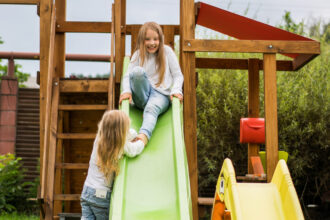What Kids Really Want When They Act Out (And How to Help)


Kids don’t come with a manual, and they definitely don’t come with a script that tells you exactly what they need when they’re melting down. But the truth is, when kids act out, they’re not just trying to be difficult or make life harder for everyone around them. It’s their way of saying, “Something’s not right, and I don’t know how to tell you.”
Understanding what’s really going on behind the yelling, stomping, or refusing to listen can make all the difference. And once you get it, responding in a way that actually helps — instead of just reacting — gets a whole lot easier.
Table of Contents
Why Do Kids Act Out?
Picture this: You’re starving, exhausted, and completely overwhelmed by your day. Now imagine not having the words to explain any of that. That’s what it feels like for kids when they act out. They’re trying to say something, but they just don’t have the language to get it out clearly.
Here are some of the big reasons kids act out:
- Attention, Please: If a kid feels like they’re not being seen or heard, they might do something — anything — to grab your attention. It might not be positive, but hey, it works.
- Feeling Overwhelmed: Too many activities, too many rules, or just too much going on can push a kid to their limit. Acting out is their way of hitting the reset button.
- Basic Needs Aren’t Met: Hunger, exhaustion, or being too hot or cold can easily trigger a meltdown. Think about how cranky most adults get when they’re hungry, then multiply that by ten.
- Testing the Limits: Kids are always learning where the boundaries are, and sometimes they test them just to see what happens. It’s not always intentional; it’s more like an experiment.
- Frustration or Confusion: When kids can’t find the words to say what they’re feeling — like “I’m scared” or “I don’t understand” — they might throw a toy or scream instead.
What Are They Really Trying to Say?
Here’s the thing: Kids aren’t great at saying, “I’m feeling left out” or “I need a break.” But their behavior often says it for them. The trick is learning how to decode it.
- Notice the Patterns: Does the acting out always happen after school? Or right before bedtime? Spotting when the behavior flares up can give you clues about what’s setting them off.
- Watch the Body Language: A kid who’s clenching their fists, crossing their arms, or refusing to look at you is saying something — and it’s probably not, “I’m totally fine.”
- Listen to the Tone: The words might not make sense, but the way they say them can tell you a lot. Whiny, loud, or extra quiet? That’s a clue.
For families who have an au pair or regular caregiver, this can be a game-changer. Someone who’s around all the time might notice things parents miss — like how a kid always seems to lose it right after a long day or how they act out more when they’re tired or hungry.
If finding reliable, consistent care feels like a challenge, visiting goaupair.com can connect you with trusted au pairs who can step in and provide that extra support. Having that extra set of eyes and ears can help everyone get on the same page.
Responding Without Reacting
When a kid is losing it, it’s easy to jump straight to discipline or punishment. But the goal isn’t to “fix” the behavior — it’s to figure out what’s causing it.
- Stay Cool: Easier said than done, right? But if you’re calm, it’s easier for them to calm down too. Take a deep breath before you respond.
- Acknowledge the Feeling: Instead of saying, “Stop yelling,” try, “I can see you’re really upset.” It shows them you’re paying attention and that their feelings matter.
- Give Simple Choices: When kids feel like they have some control, they’re less likely to act out. Offer two simple options: “You can cool off with some water or draw for a bit — what do you want to do?”
- Redirect the Energy: If a kid is banging on the table or stomping around, suggest a safer way to get that energy out: “Let’s go outside and kick a ball for a minute.”
- Be Clear About Limits: Calmly say, “It’s okay to be mad, but it’s not okay to hit.” Then show them a better way to express it, like using words or taking some space.
Teaching Kids to Recognize Their Feelings
Kids don’t come pre-loaded with the skills to talk about their feelings. But teaching them to recognize and name those feelings can prevent a lot of meltdowns.
- Use Simple Words: Instead of asking, “What’s wrong?” say, “Are you feeling mad, sad, or tired?” Giving them simple choices helps them pinpoint what’s going on.
- Show How It’s Done: If you’re frustrated because dinner’s burning and the dog’s barking, say it out loud: “I’m feeling really stressed right now. I need a minute to calm down.”
- Find Creative Outlets: Not every kid wants to talk. Some might prefer to draw, run around, or listen to music when they’re upset. Help them figure out what works best.
When the Behavior Doesn’t Stop
Sometimes, no matter how much you try, the acting out keeps happening. If it’s intense, nonstop, or starting to affect other parts of their life, it might be time to dig a little deeper.
- Look for Patterns Over Time: Is it always after a specific event, like a new sibling arriving or starting a new school?
- Think About Developmental Milestones: Kids go through stages where they’re more likely to test limits, like during toddlerhood or the tween years.
- Consider Professional Support: If the behavior is causing big problems at home, school, or with friends, talking to a child therapist or counselor can help.
And for families trying to keep everything together — work, school, and everything else — having extra help can make a world of difference. Au pairs, for example, can provide that consistent care and attention that helps kids feel more secure. Sometimes, just having another trusted adult around to talk to or play with can be enough to ease a child’s stress and cut down on acting out.
Turning Chaos Into Connection
When kids act out, it’s not about being “bad” or “difficult.” It’s their way of saying, “I need something,” even if they can’t put it into words. By taking a step back and looking for what’s really going on — hunger, frustration, boredom, or just feeling ignored — parents and caregivers can respond in a way that helps kids feel heard and understood.
And for families who feel like they’re always playing catch-up, bringing in someone who can be that extra set of eyes, ears, and hands — like an au pair — can make those tough moments a lot easier to handle.






